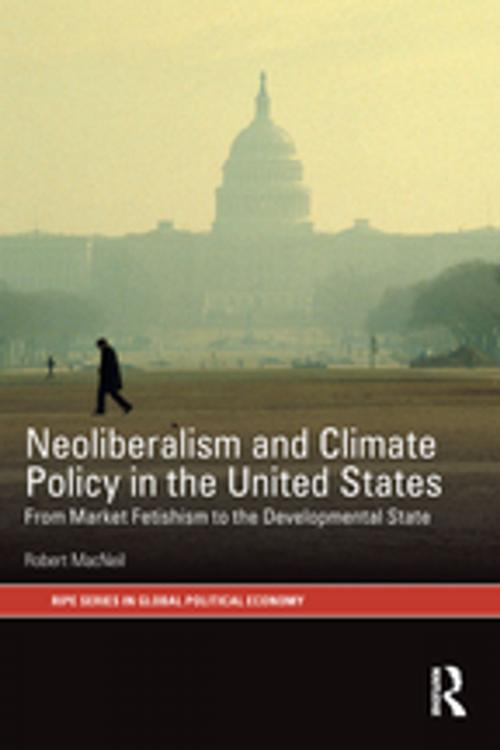Neoliberalism and Climate Policy in the United States
From market fetishism to the developmental state
Nonfiction, Social & Cultural Studies, Political Science| Author: | Robert MacNeil | ISBN: | 9781134975969 |
| Publisher: | Taylor and Francis | Publication: | July 6, 2017 |
| Imprint: | Routledge | Language: | English |
| Author: | Robert MacNeil |
| ISBN: | 9781134975969 |
| Publisher: | Taylor and Francis |
| Publication: | July 6, 2017 |
| Imprint: | Routledge |
| Language: | English |
This book explores how Washington’s efforts to act on climate change have been translated under conditions of American neoliberalism, where the state struggles to find a stable and legitimate role in the economy, and where environmental and industrial policy are enormously contentious topics.
This original work conceptualizes US climate policy first and foremost as a question of innovation policy, with capital accumulation and market domination as its main drivers. It argues that US climate policy must be understood in the context of Washington’s broader efforts over the past four decades to dominate and monopolize novel high-tech markets, and its use of immense amounts of state power to achieve this end. From this perspective, many elements of US climate politics that seem confusing or contradictory actually appear to have an obvious and consistent logic.
This book will be of particular interest to students and scholars of IPE, as well as individuals generally interested in gaining a stronger understanding of US climate politics and policy, and the role and influence of neoliberalism on contemporary economic governance.
This book explores how Washington’s efforts to act on climate change have been translated under conditions of American neoliberalism, where the state struggles to find a stable and legitimate role in the economy, and where environmental and industrial policy are enormously contentious topics.
This original work conceptualizes US climate policy first and foremost as a question of innovation policy, with capital accumulation and market domination as its main drivers. It argues that US climate policy must be understood in the context of Washington’s broader efforts over the past four decades to dominate and monopolize novel high-tech markets, and its use of immense amounts of state power to achieve this end. From this perspective, many elements of US climate politics that seem confusing or contradictory actually appear to have an obvious and consistent logic.
This book will be of particular interest to students and scholars of IPE, as well as individuals generally interested in gaining a stronger understanding of US climate politics and policy, and the role and influence of neoliberalism on contemporary economic governance.















